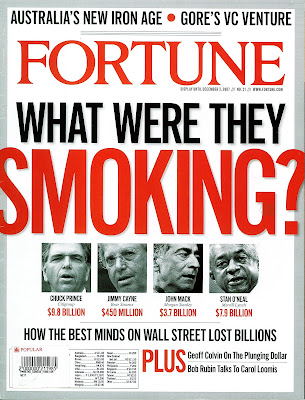True Blessing
In its December 2007 issue, Fortune Magazine subtitled its report on the Wall Street financial crisis arising out of mortgage debt as “the subprime mortgage crisis keeps getting worse—and claiming more victims.” The subprime crisis caused billions of dollars in losses then. The share prices of Citigroup and Merrill Lynch, America’s biggest commercial and investment bank respectively, dropped 35%. Many other Wall Street financial giants such as Bank of America, Credit Suisse, etc posted billions of US$ losses.
Nine months on in 2008, the statement, “the subprime mortgage crisis keeps getting worse—and claiming more victims” is still true. Mortgage giants FannieMae & FreddieMac needed US government intervention to stop going under. Bear Sterns, Lehman Brothers and Merrill Lynch, three of Wall Street’s biggest five investment banks, sold or forced into bankruptcy. When these financial dominos fall, they send jitters through the world economy. Already we see the shockwaves in various stock markets around the world. The future looks grim indeed with financial losses and unemployment looming.
Many were affected, including Christians. As Christians, what are the lessons that we can take with us? One immediate thought is learning contentment, amidst trial and tribulation. Paul was in prison yet he was contented. (Phil 4:11, 12) “… I have learned to be content whatever the circumstances. I know what it is to be in need, and I know what it is to have plenty. I have learned the secret of being content in any and every situation, whether living well-fed or hungry, whether living in plenty or in want.” What was Paul’s secret? “I can do everything through Him who gives me strength” (Phil. 4:13). Jesus was Paul’s all-in-all. Jesus should be our all-in-all. If he truly is, we will obtain the grace to withstand the losses. We will learn to reduce our living expenses to match our income. We will learn to ask, “How much do I want before I say I have enough?” We may learn that the next car, gadget, appliance is not something we really need. Perhaps we can also teach our children that the next videogame or toy or clothes or sportswear may not really be necessary and that they could do with a cheaper version or even not at all. Then when the economy looks rosier and our living picks up, we will remember Jesus’ exhortation, “…a man’s life does not consist in the abundance of his possessions”(Luke 12:15). This is what caused the downfall of Wall Street’s investment bankers – imprudence arising out of discontentment with what they already possessed.
The other is to avoid ill-gotten gain. One news article described the crux of the sub-prime crisis was because these banks “bought each other’s debt and erased one another’s risk by dealing with one another in a giant chain letter.” It was paper wealth that was unethical if not downright illegal. Wealth per se is not a sin. It is our security in adverse times and it has the power to influence things for good. I believe God expects us to work and, at the same time, be a good steward and prudently handle the wealth and resources that we accumulate from our labour. But I also believe our means to attain wealth as well as the ends to which we use our wealth matters to him. Wealth, ill-used or ill-gotten displeases God.
Let us learn to live life by the standards that God expects of us. When we do so, we are blessed and “the blessing of the Lord brings wealth and He adds no trouble to it” (Prov 10:22).


.jpg)
Comments
Post a Comment